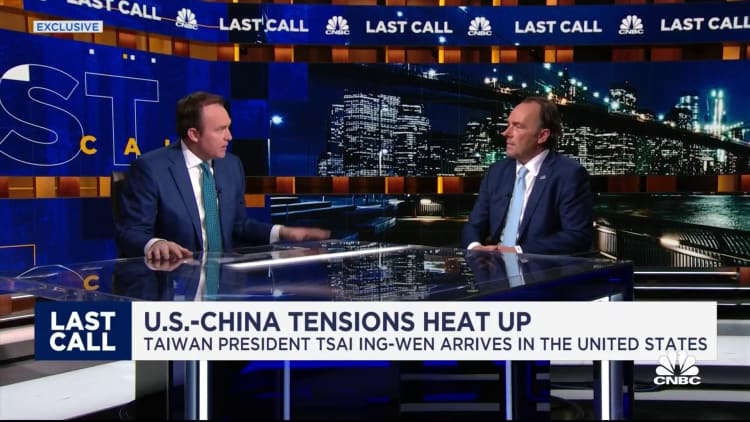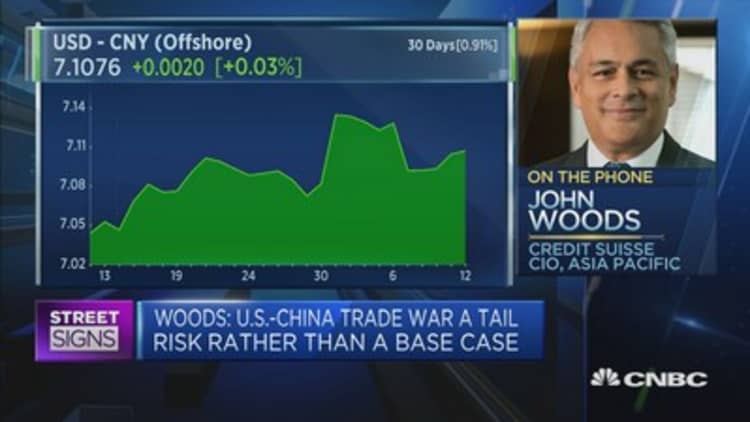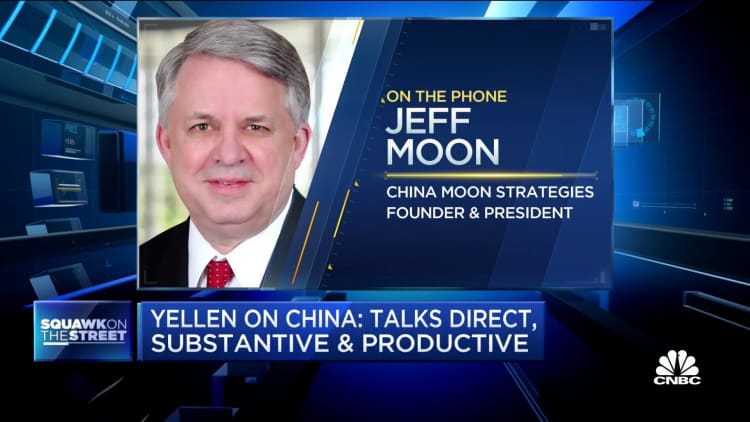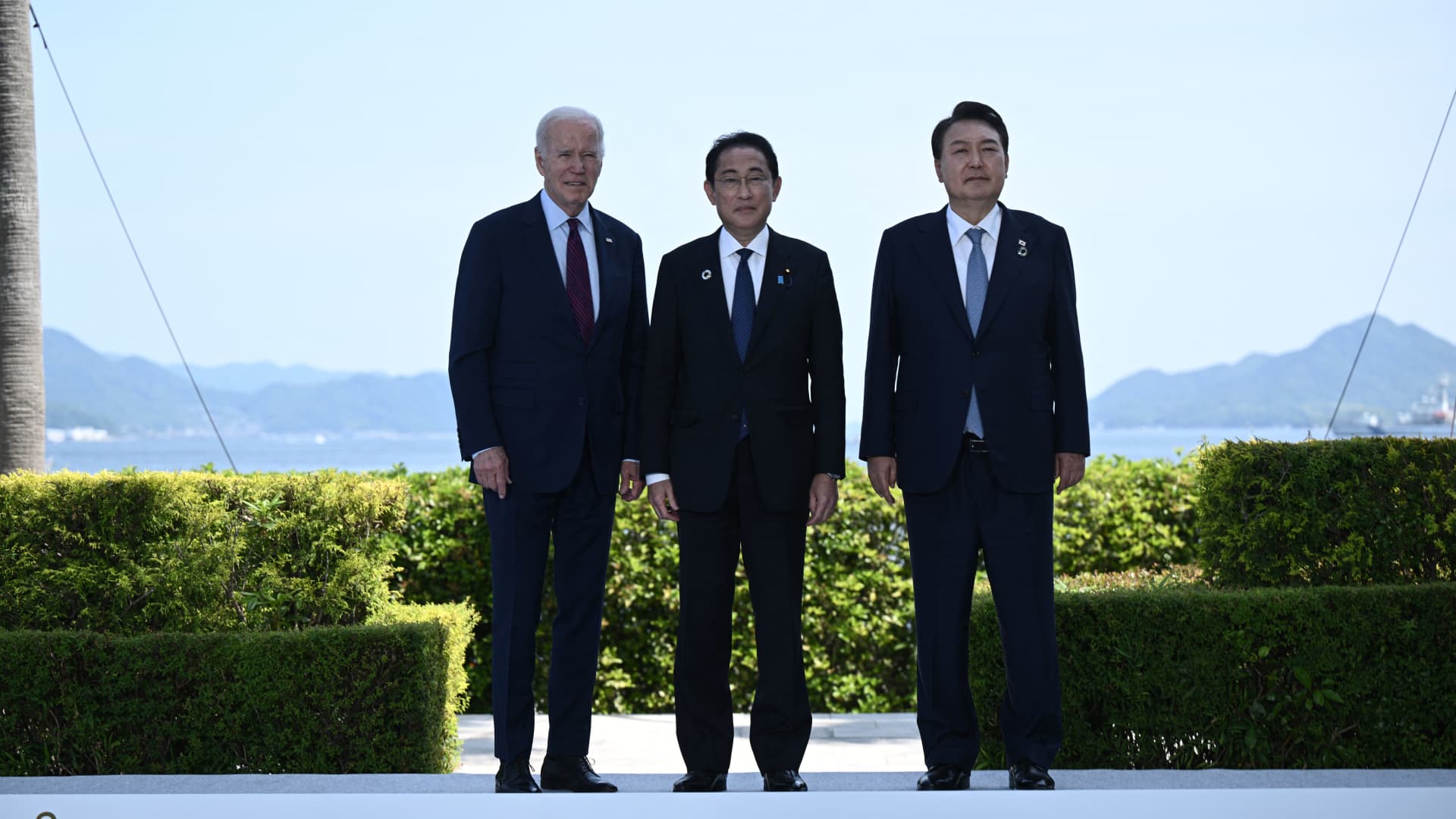US President Joe Biden, Japan’s Prime Minister Fumio Kishida, and South Korea’s President Yoon Suk Yeol pose for photos ahead of their trilateral meeting during the G7 Leaders’ Summit in Hiroshima on May 21, 2023. (Photo by Brendan SMIALOWSKI / AFP) (Photo by BRENDAN SMIALOWSKI/AFP via Getty Images)
Brendan Smialowski | Afp | Getty Images
A U.S. summit with Japan and South Korea will lay out “ambitious” steps to bolster trilateral security ties in the Indo-Pacific region, a senior Biden administration official said, adding its also aimed at deterring China’s growing aggression.
President Joe Biden will unveil the measures with Japanese Prime Minister Fumio Kishida and South Korean President Yoon Suk Yeol at Camp David on Friday, said Kurt Campbell, the White House coordinator for Indo-Pacific affairs.
“This is the first visit of foreign leaders to Camp David in the last several years since President Biden came to office,” Campbell said in a preview of the summit at a Brookings Institution event on Wednesday.
“I think we all understand the significance when a meeting is held there. It’s meant to signal with deep symbolism the importance that we attach to this momentous moment. What you will see on Friday is a very ambitious set of initiatives that seek to lock in trilateral engagement both now and into the future.”
The summit at Camp David will be the first standalone meeting between the three countries as Washington seeks to capitalize on rapidly improving ties between its two closest security alliances in Asia.
Plans will also be announced to make it an annual event and to invest in technology for a three-way hotline, Campbell added, to allow the governments to communicate during a crisis.

The summit is a “big deal” and happening now because the geopolitical situation “is just so uncertain and unstable,” said Victor Cha, senior vice president and Korea Chair at the Center for Strategic and International Studies.
“The war in Ukraine has had the effect of reducing the gap between the Euro-Atlantic and Indo-Pacific theaters, and causing countries to think – to prioritize national security over other issues that might sometimes get in the way,” he told a press briefing this week.
Beijing’s assertive posture has added to “this uncertainty and brought it even closer to home,” Cha added, as well as North Korea’s hostile behavior in the region.
At a regular media briefing Tuesday, China’s foreign ministry spokesperson Wang Wenbin said Beijing “opposes relevant countries assembling exclusionary groupings, and practices that intensify antagonism and undermine the strategic security of other countries.”
Wary over Beijing
Campbell noted that countries in the Indo-Pacific understand the critical role the U.S. plays in maintaining peace and stability in the region and are looking to counter Chinese pressure.
“I don’t think many countries accept the idea that this is somehow a noose or effort to contain China,” he said. Most countries in the region have “deep, profound economic and political interests,” and a “steady and stable relationship” with China, Campbell added.
“What they sense and what they witness is a China whose actions have demonstrably changed in recent years in ways that threaten their security and that raise larger concerns both nationally and in the region.”
U.S.-Chinese relations recently hit their lowest point in years. Tensions escalated over a suspected Chinese surveillance balloon which flew over the United States.
China, basically, in the region will never win the award for the good neighbor policy. This region is desperate for more of America… China is unanchored, untethered, is a risk to the region.”
Rahm Emanuel
U.S. ambassador to Japan
Earlier this month, Biden slammed China‘s economic situation as “a ticking time bomb,” his latest dig at Beijing even as his administration tries to soothe relations with what it calls Washington’s top competitor.
The battle for technological supremacy between the two economic superpowers has also led to punitive measures like trade and investment restrictions.
Indo-Pacific nations are “desperate” for an increased U.S. presence in the region, said Rahm Emanuel, the U.S. ambassador to Japan, at the same Brookings Institution event.
“China, basically, in the region will never win the award for the good neighbor policy,” he said. “This region is desperate for more of America … China is unanchored, untethered, is a risk to the region.”
Beijing will look “on warily as Biden, Kishida, and Yoon meet, having tried unsuccessfully to resurrect its own trilateral summits with Japan and South Korea, which last occurred in December 2019,” Eurasia analysts wrote in a note.

China has “warned Tokyo and Seoul against pursuing greater trilateral security cooperation with Washington, but its diplomatic pressure is backfiring,” they added.
Japan-South Korea ties
The summit will be seen as a major victory for the White House, which has been urging Tokyo and Seoul to move beyond their longstanding issues over Japan’s wartime behavior.
Biden and his senior team have supported this effort “the entire time that we’ve been in office,” said Campbell, through “private, discreet dialogues” with both countries.
The Biden administration “deserves a lot of credit,” noted Cha from CSIS. The summit is “a culmination of a lot of hard work by people inside the administration for over a year now,” he said.
Campbell also praised the political courage of Yoon and Kishida in mending ties fraught with historical baggage, calling it “a breathtaking kind of diplomacy.”
“What President Yoon and Prime Minister Kishida have done has defied expectations. They have sometimes against the advice of their own counselors and staff, taken steps that elevate the Japan-South Korean relationship into a new plane,” he added.
In March, Yoon’s government announced a landmark agreement over compensation payments for South Korean victims of Japanese wartime forced labor. It enabled both two sides to resume shuttle diplomacy and normalize a military intelligence-sharing agreement.

As for Beijing, it faces few “effective options to reverse this trilateral momentum,” said analysts at Eurasia.
“China stands little chance of driving a wedge between Japan and South Korea — which despite rapprochement remains the weak link in the trilateral relationship — so long as Yoon remains in office,” they wrote.
Any attempt to target one of the countries through “economic coercion” also “risks backfiring” and driving them “even closer together,” the analysts added.
The agreements reached at the summit would be “a substantial step forward in recognizing the common security picture that each of the countries are facing” that requires “common actions,” noted Campbell.
“I think we can imagine a future with more ambition, but … the key is not to get too far over your skis, to take this a step at a time to build appropriately to not get beyond the domestic context of which we’re dealing.”

